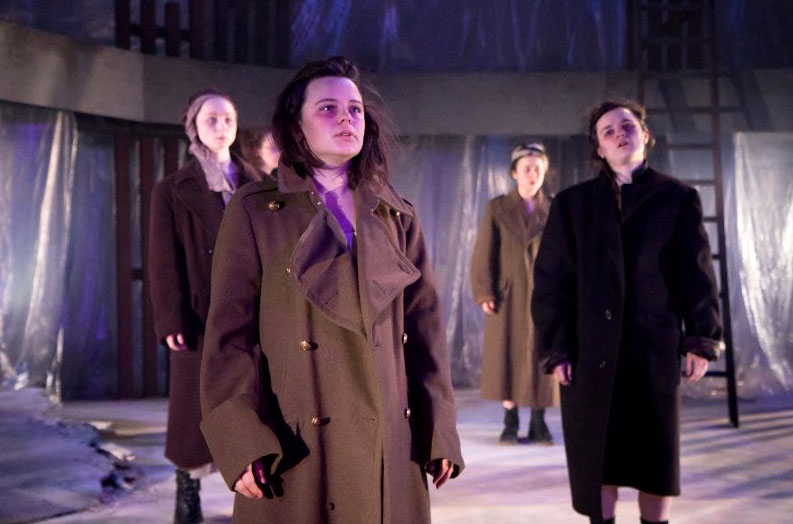
Written around 2400 years ago, The Trojan Women is one of those plays that commands great respect, but which can seem rather distant and forbidding. Its themes are undeniably dark: husbands killed, children slaughtered, women taken into slavery, a great city ruined; and all this watched over and manipulated by gods who seem indifferent to human suffering. The style of many translations has often been overly formal and entirely remote from everyday speech: ‘Woe, woe is thee! What piteous dirge wilt thou devise to mourne the outrage done thee? is typical. But it has proved to be a highly flexible work that can give modern writers a framework within which to comment on the never-ending tragedy of war. Some writers have updated Euripides’ original with very specific targets in mind. For example, in Charles L. Mee’s postmodern adaptation, Trojan Women: A Love Story, there are less than subtle references to American foreign policy, such as a song-and-dance number entitled ‘You Dropped a Bomb on Me’.
Fortunately, this BOVTS production eschews such clunky, overly-obvious topicality. This, thankfully, is a version which remains largely true to the spirit of the original while clearly having a direct relevance to our own troubled times. Writer Brendan Kennelly’s language is vigorously contemporary, employing rhythm and rhyme but often shockingly direct and free from poetic euphemism when describing the fate that awaits these women when the winners take the spoils of victory. Director Sally Cookson has ensured that the focus is upon the universal timeless themes of female suffering and female resilience. That the central characters are to be thought of foremost as simply women is emphasized by the drab uniformity of their unadorned costumes. Brave, sharp Hecuba may be Queen of Troy, but in appearance she is indistinguishable from the others, defiant but vulnerable on a bare stage scattered with the greatcoats of fallen men. This is a play that can often seem rather static, with central characters delivering speeches in a declamatory style and with commentary offered by a formally organized and entirely separate Chorus. In this production movement directors Cameron Carver and Michelle Gaskell have created a dynamic choreography that often brings them all together, an integration underlined by having the actors who play Andromache, Cassandra and Helen all doubling as members of the Chorus. A wonderfully poignant moment comes as they all light up with joy when remembering the excitement of first seeing the great horse that later proved to have a belly ‘packed full of death’. When hearing dreadful news they sway together like treetops in a strong wind.
Memorable individual performances include Eleanor Jackson’s as Cassandra, a wild, whirling creature who knows she is to become ‘the plaything of Agamemnon’s lust’, but who in moments of clarity foresees doom for him too. Whitney Kehinde as Andromache is deeply moving as a mother who must see her baby taken away to be thrown from the walls of Troy because, as Hector’s son, he represents a future danger to the Greeks. The undoubted dramatic highlight of the play comes when we finally see Helen, whose beauty has brought all this destruction upon Troy. Her confrontation with the vengeful Menelaus brings a welcome shift in mood: ‘Drag that bitch from where she’s hiding in some stinking corner’. Michelle Fox shows Helen giving a spirited, persuasive defence of her actions, though her excuse that the goddess Aphrodite is to blame for her waywardness cuts no ice with the other women, who circle around her like playground bullies, hissing venomously. Helpless before the might of the Greeks, all their hatred and aggression becomes focused upon another woman. Hannah Bristow gives a commanding, heart-wrenching performance as Hecuba, most especially in her final great soliloquy when she realizes that despite all the suffering and humiliation she still has a precious sense of her own identity, a knowledge of self that cannot be taken from her and which gives her a kind of power over her conquerors. Her destiny and that of the other women is to become a ‘warm, melting, fertile prize’ for the conquering Greeks, but she has found wisdom in endurance. The Trojan Women is most definitely an important play, but there are few if any flashes of light to break through the relentless darkness. Nevertheless, this is an imaginatively directed production full of fine performances from its young cast, and it is well worth seeing. ★★★☆☆ Mike Whitton 8th March 2016
Photo by Toby Farrow

